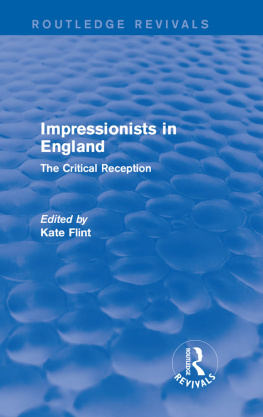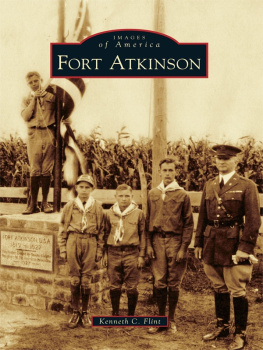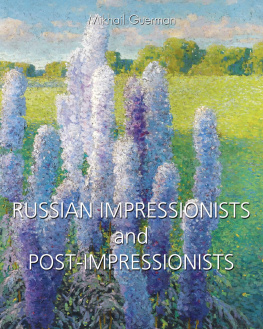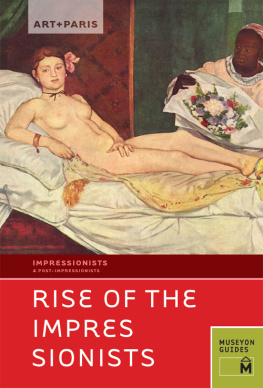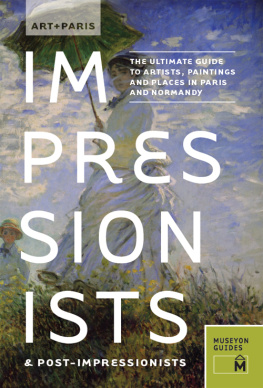Flint - Impressionists in England The Critical Reception
Here you can read online Flint - Impressionists in England The Critical Reception full text of the book (entire story) in english for free. Download pdf and epub, get meaning, cover and reviews about this ebook. City: London Routledge, year: 2016, publisher: Taylor and Francis;Routledge, genre: Detective and thriller. Description of the work, (preface) as well as reviews are available. Best literature library LitArk.com created for fans of good reading and offers a wide selection of genres:
Romance novel
Science fiction
Adventure
Detective
Science
History
Home and family
Prose
Art
Politics
Computer
Non-fiction
Religion
Business
Children
Humor
Choose a favorite category and find really read worthwhile books. Enjoy immersion in the world of imagination, feel the emotions of the characters or learn something new for yourself, make an fascinating discovery.
- Book:Impressionists in England The Critical Reception
- Author:
- Publisher:Taylor and Francis;Routledge
- Genre:
- Year:2016
- City:London Routledge
- Rating:5 / 5
- Favourites:Add to favourites
- Your mark:
- 100
- 1
- 2
- 3
- 4
- 5
Impressionists in England The Critical Reception: summary, description and annotation
We offer to read an annotation, description, summary or preface (depends on what the author of the book "Impressionists in England The Critical Reception" wrote himself). If you haven't found the necessary information about the book — write in the comments, we will try to find it.
Flint: author's other books
Who wrote Impressionists in England The Critical Reception? Find out the surname, the name of the author of the book and a list of all author's works by series.
Impressionists in England The Critical Reception — read online for free the complete book (whole text) full work
Below is the text of the book, divided by pages. System saving the place of the last page read, allows you to conveniently read the book "Impressionists in England The Critical Reception" online for free, without having to search again every time where you left off. Put a bookmark, and you can go to the page where you finished reading at any time.
Font size:
Interval:
Bookmark:

Routledge Revivals
Impressionists in England
First published in 1984. The late nineteenth and early twentieth centuries represent not only an era of rapidly changing artistic methods but a crucial evolution in art criticism. This book gathers together a wide-range of the criticism that greeted the work of the Impressionist artists in the English Press. The selected examples of praise and antagonism reflect the sentiments expressed in the comments of prominent newspaper and periodical critics. The selection shows the importance of Impressionist art to English art criticism and wider comprehension of the formal qualities in painting. It also demonstrates how forward-looking critics created new criteria for the discussion of modern painting.
Impressionists in England
The Critical Reception
Edited by
Kate Flint

First published in 1984
by Routledge & Kegan Paul
This edition first published in 2016 by Routledge
2 Park Square, Milton Park, Abingdon, Oxon, OX14 4RN
and by Routledge
711 Third Avenue, New York, NY 10017
Routledge is an imprint of the Taylor & Francis Group, an informa business
1984 Kate Flint
All rights reserved. No part of this book may be reprinted or reproduced or utilised in any form or by any electronic, mechanical, or other means, now known or hereafter invented, including photocopying and recording, or in any information storage or retrieval system, without permission in writing from the publishers.
Publishers Note
The publisher has gone to great lengths to ensure the quality of this reprint but points out that some imperfections in the original copies may be apparent.
Disclaimer
The publisher has made every effort to trace copyright holders and welcomes correspondence from those they have been unable to contact.
A Library of Congress record exists under LC control number: 83024587
ISBN 13: 978-1-138-64844-9 (hbk)
ISBN 13: 978-1-315-62638-3 (ebk)
IMPRESSIONISTS IN ENGLAND
The Critical Reception
Edited by
KATE FLINT
Department of English
University of Bristol

First published in 1984
by Routledge & Kegan Paul plc
39 Store Street, London, WC1E 7DD, England
9 Park Street, Boston, Mass. 02108, USA
464 St Kilda Road, Melbourne,
Victoria 3004, Australia and
Broadway House, Newtown Road,
Henley-on-Thames, Oxon RG9 1EN, England
Printed in Great Britain by
T.J.Press Ltd, Padstow, Cornwall
Kate Flint 1984
No part of this book may be reproduced in
any form without permission from the publisher,
except for the quotation of brief passages
in criticism
ISBN 0-7100-9470-1
To
My Parents
Contents
Almost all the pieces reprinted in this volume are from reviews, articles or books dealing with the Impressionists which appeared in England between 1870 and 1905. The first of these dates marks the first occasion on which these artists were seen in a British gallery; the last represents the year in which the French dealer Durand-Ruel showed 315 Impressionist works in London. During the intervening years, response changed from uncertain, sometimes mocking, often hostile recognition of what was considered to be but a temporary phenomenon, to a more general, and at times enthusiastic acceptance of the Impressionists aims and methods.
Douglas Coopers Introduction to the catalogue of the Courtauld Collection has been, since 1954, the standard work on the reception of the Impressionists in England. He emphasises their relations with the English painters of the time and with the collectors. As well as correcting some of the inaccuracies and omissions in his study, I have attempted to redress the balance in favour of showing the importance of Impressionist art in this country to the development of art criticism, and the wider comprehension of formal qualities in painting. This acceptance and understanding was due above all to the efforts of a handful of critics, such as D.S. MacColl, Frederick Wedmore, R.A.M. Stevenson and Frank Rutter. If their names seem to recur rather frequently in the extracts chosen, this is because Impressionist art received but patchy coverage in the press. As the Appendix illustrates, very few exhibitions during the period were given over entirely to this movement. Hence the scattered paintings which were on show often had only a couple of lines of criticism, at most, devoted to them within the context of a longer review. The examples of praise and antagonism which I have selected, however, faithfully reflect sentiments expressed in the comments of other newspaper and periodical critics.
This volume is largely devoted to English responses, with a few American examples added by way of comparison. The French reaction to Impressionism is efficiently covered by J. Lethves Impressionnistes et Symbolistes devant la Presse (1959); G.H. Hamiltons Manet and his Critics (1954), and J. Sloanes French Painting: Artists, Critics and Tradition from 1848 to 1870 (1951). Cooper touches briefly on the impact of the Impressionists in Belgium, Germany, Russia and America, but much work remains to be done in this area. As is demonstrated by the English critics alone, the late nineteenth and early twentieth centuries represent not merely a time of rapid change in artistic methods, but a crucial moment in the evolution of art criticism.
The author and publishers gratefully acknowledge the permission of the following to reproduce the copyright material in this book:
Clive Bell, Art: Quentin Bell, Chatto & Windus and the Putnam Publishing Group, New York; Roger Fry, Vision and Design: the Authors Literary Estate and Chatto & Windus; Laurence Housman, Two Kinds of Impressionism: the Society of Authors as the literary representative of the Estate of A.E. Housman, and Jonathan Cape Ltd, publishers of A.E. Housmans Collected Poems; Camille Mauclair, The French Impressionists 18601900: Gerald Duckworth; Bernard Shaw, The Sanity of Art: the Society of Authors on behalf of the Bernard Shaw Estate; Walter Sickert, A Free House: David Higham Associates.
Every effort has been made to discover the copyright holders of the work by J. Stanley Little and Frank Rutter, and of D.S. MacColls periodical criticism, but without success. I am grateful in this respect to Philippa Mac-Liesh and to the staff of Glasgow University Library, where the MacColl collection is housed.
I would like to thank my editor, Mrs Cecilia Powell, for her great patience and tolerance. Among the many friends and colleagues who have helped and encouraged me, I owe especial thanks to Stephen Brook and Bernard Richards, for pushing the idea in the first place; to Paddy Hillyard, for reading and commenting on the first draft of the introduction; to John and Diana Burrow, for support and hospitality; to Thomas Wiedermann, for supplying the Lucretius translation, and to the secretaries of the Department of English, Bristol University, Marjorie Taylor and Jan Tarling, for unflagging assistance and cheerfulness.
I am greatly indebted to the staff of the Bodleian Library, Oxford, Bristol City Library, Bristol University Library, the British Library (particularly the Newspaper Division at Colindale), the Courtauld Institute, and the National Art Library at the Victoria and Albert Museum.
Next pageFont size:
Interval:
Bookmark:
Similar books «Impressionists in England The Critical Reception»
Look at similar books to Impressionists in England The Critical Reception. We have selected literature similar in name and meaning in the hope of providing readers with more options to find new, interesting, not yet read works.
Discussion, reviews of the book Impressionists in England The Critical Reception and just readers' own opinions. Leave your comments, write what you think about the work, its meaning or the main characters. Specify what exactly you liked and what you didn't like, and why you think so.

